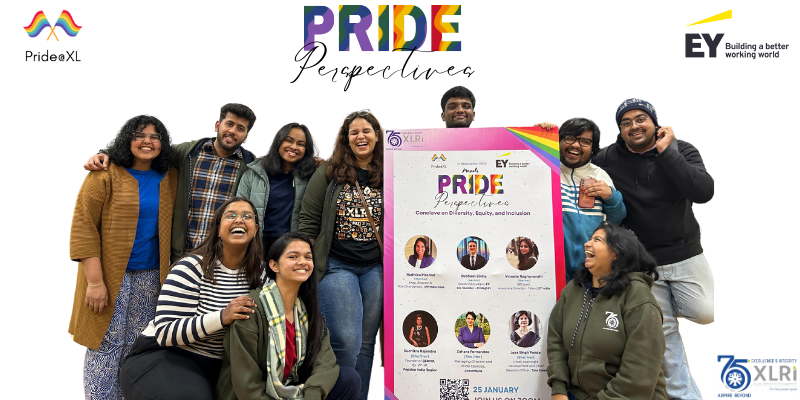
Reported and edited by Shiwangee Chandrakar
Nestled amidst the vibrant student life of XLRI in Jamshedpur, Pride@XL, the institute’s LGBTQ+ club, stands as a symbol of hope and inclusivity. Recently, Pride@XL hosted Pride Perspectives, a first-of-its-kind Diversity, Equity, and Inclusion (DEI) Conclave, offering a platform for open dialogue and learning about fostering welcoming workplaces for all. The conclave saw the participation of over 300 folks, both virtually and in person on the campus. Registrations included students and professionals from IIM Ahmedabad, IIM Bangalore, IIM Ranchi, IIM Kashipur, BITS Pilani, HCL, Mahindra Logistics, Byjus, and Accenture, among others.
The first-panel discussion kicked off with Subham Sinha, Pride@XL co-founder and a senior consultant at EY, offering a warm embrace of hope: “The world is a large place,” he proclaimed, “There is a space for acceptance for everyone.” Radhika Piramal, VP & ED of VIP Industries and an LGBTQIA+ advocate followed with a poignant reminder of the complexities of coming out: “It should be safe and it should be your choice,” she emphasized, calling for proactive diversity initiatives. Beyond coming out, she outlined actionable steps for creating inclusive workplaces, urging companies to implement anti-discrimination policies, remove gendered language, and actively target diverse candidates. The discussion concluded with a crucial question: how to avoid tokenism in diversity initiatives? Radhika’s response was multifaceted – persuasion, appealing to morals, and changing the system from within. This encouraged young attendees to become active agents of change, not just passive beneficiaries of token gestures.
In the second-panel discussion, Zahara Fernandes, Managing Director of Accenture Operations and Pride Sponsor for Accenture in India, ignited the conversation by highlighting the challenges faced by marginalized groups. Suchitra Rajendra, Founder of QED!HR and former CHRO of PepsiCo India then underscored the power of challenging biases: “All of us are biased,” she declared, “We must break barriers and push boundaries.” She lauded the growing momentum of the DEI movement in India, urging young people to be vocal and participate actively in shaping inclusive workplaces.
Zahara who has navigated the complexities of bisexual identity, shared her journey of building alliances and fostering understanding. She highlighted the power of reverse mentoring as a tool for leaders to learn from the LGBTQ+ community and advocated for zero tolerance for discrimination. Their collective message is – “You have to own your cause. Push the envelope. Don’t forget to be happy with who you are.” – empowered the audience to embrace their identities and fight for their rights.
In the third-panel discussion, Jaya Panda, Chief of Learning and Development and Chief Diversity Officer at Tata Steel, showcased how audacious leadership can drive change. Tata Steel’s successful integration of over 100 transgender people highlights the same. The success of this initiative wasn’t merely a one-time act of hiring. The discussion stressed upon the importance of continuous dialogue as they learned from the transgender community and other stakeholders, constantly adapting their policies and training programs to meet specific needs. This iterative approach highlighted the significance of active listening and flexibility in fostering inclusivity. Employee resource groups like WINGS were highlighted as crucial safe spaces and sources of peer support. And beyond these groups, a call to action rang out: young leaders must speak up and participate in policymaking. “Change doesn’t always come from the top,” the message resonated. Collective action is the key to unlocking progress.
Jaya’s insightful discussion on intersectionality and policymaking resonated with the complexities of diverse identities. A nuanced approach was discussed: a core set of principles applicable to everyone, regardless of identity, while simultaneously tailoring specific elements to address the unique needs of diverse groups within the organization. This challenged the audience to move beyond one-size-fits-all solutions and embrace a more flexible, human-centered approach.
The final message resonated with the aspiring leaders in the room: “Be authentic. Stand for what you believe in. Change will never happen if you’re quiet,” This call to action, fueled by the inspiring examples and practical strategies shared, empowered young individuals to leverage their privilege and intellect into vocal advocacy for change. As we strive towards truly inclusive corporate spaces in India, events like Pride Perspectives play a crucial role in creating safe spaces for dialogue, challenging societal norms, and empowering young voices. The conclave serves as a testament to the progress made while reminding us that the journey toward true DEI is dynamic.
